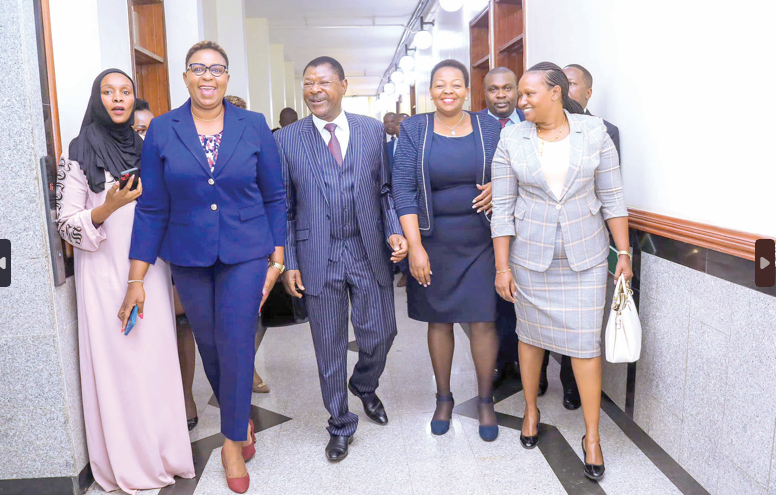MPs in fresh push to have gender rule implemented
By Mercy.Mwai, February 29, 2024MPs are plotting changes to the law to achieve the elusive two-thirds gender rule at the National Assembly and the Senate.
The proposed constitutional amendments to the elections law have been recommended by the Multi Sectoral Working Group to provide for gender top up using party lists.
National Assembly Speaker Moses Wetangula told MPs that the proposal is akin to the practice currently being used in the county assemblies to achieve the gender rule.
The Group appointed by President William Ruto to develop and recommend a framework for the implementation of the Principle has also recommended that the Elections Act, 2011 be amended to provide for submission of party lists that comply with the two-thirds Gender Principle.
The group also recommended that the Political Parties Act, 2011 be amended to provide for establishment of the Women Inclusion and Political Participation Fund for purposes of financing education and training, mentorship and capacity building, including support for women seeking elective positions.
In his communication to the house, Wetangula who told MPs that the report will be tabled for debate advised the House Business Committee (HBC) to prioritise the consideration of the report.
He said: “I wish to notify you that I am in receipt of the Report of the Multi-Sectoral Working Group on the Realisation of the two-thirds Gender Principle as submitted by the Cabinet Secretary, Ministry of Gender, Culture, The Arts and Heritage, Hon Aisha Jumwa. The Report is scheduled for tabling by the Hon Majority Leader today.”
Held meeting
He added: “Further, Honourable Members, as you may be aware, last week, the leadership of both Houses of Parliament also held a meeting with the Cabinet Secretary, Ministry of Gender, Culture, the Arts and Heritage, and the Multi-Sectoral Working Group. During the meeting, the commitment of Parliament towards ensuring the implementation of the two-thirds Gender Principle was reiterated and reaffirmed.”
The group also recommended the enactment of Equality Law and legislation to implement Article 100 of the Constitution.
It also made a raft of recommendations that require administrative action aimed at achieving gender equality and empowerment of women.
On Thursday last week, Wetangula and his Senate Counterpart Amason Kingi, held a meeting with the Gender, Culture, Arts, and Heritage CS, Aisha Jumwa, KEWOPA and the MSWG where they agreed on making President William Ruto’s plan to meet the two third gender rule in leadership a reality.
During the meeting, they emphasised the need to include the said plan in the National Dialogue Committees.
And on Tuesday, Opposition leader Raila Odinga also held a meeting with Jumwa during which they discussed ways of realising the elusive two-thirds gender rule.
The meeting was held at Raila’s Capitol Hill office. It came a day after Raila and President Ruto were hosted by Ugandan president Yoweri Museveni at his Kisozi home in Western Uganda and during which they discussed the opposition leader’s candidature for the African Union Commission (AUC) chairperson.
Ruto in December 2022, wrote a memorandum to the two House speakers highlighting the need to implement the two-thirds gender rule.
He proposed a top up of 40 more women in the National Assembly and senate.
Said Ruto: “It is regrettable that implementation has become a conundrum. There is a profound sense that we have failed Kenya’s women and I believe it is time to make a decisive breakthrough.”
The recommendation of the Multi- Sectoral Working Group comes after the House adopted the Report of the National Dialogue Committee which recommended that the Group finalises its work, and recommend a framework of implementation of the said Gender Principle and submit its report to Parliament for consideration.
At the moment, the maximum number required to meet the two-thirds threshold is 26 in the National Assembly and 14 in the senate.
Member constituencies
A total of 76 women were elected to the National Assembly comprising 47 women representatives and 29 women elected to represent single member constituencies which is a 30 percent increase from 2017 where only 29 women were elected while the senate comprises three elected women and 16 nominated ones.
Implementation of the two-thirds gender rule has remained elusive despite more than four attempts by MPs to push it through.
The latest attempt to push for the passage of the said rule was through the Building Bridges Initiative (BBI) which collapsed after a landmark ruling declaring the process illegal.
An advisory by former Chief Justice David Maraga for President Uhuru Kenyatta to dissolve Parliament over the failure to implement the two-thirds gender rule also failed to yield results.
MPs were required to give effect to Articles 27 (8) and 81(b) of the Constitution to ensure not more than two-thirds of members in elective and appointive positions are of the same gender.
